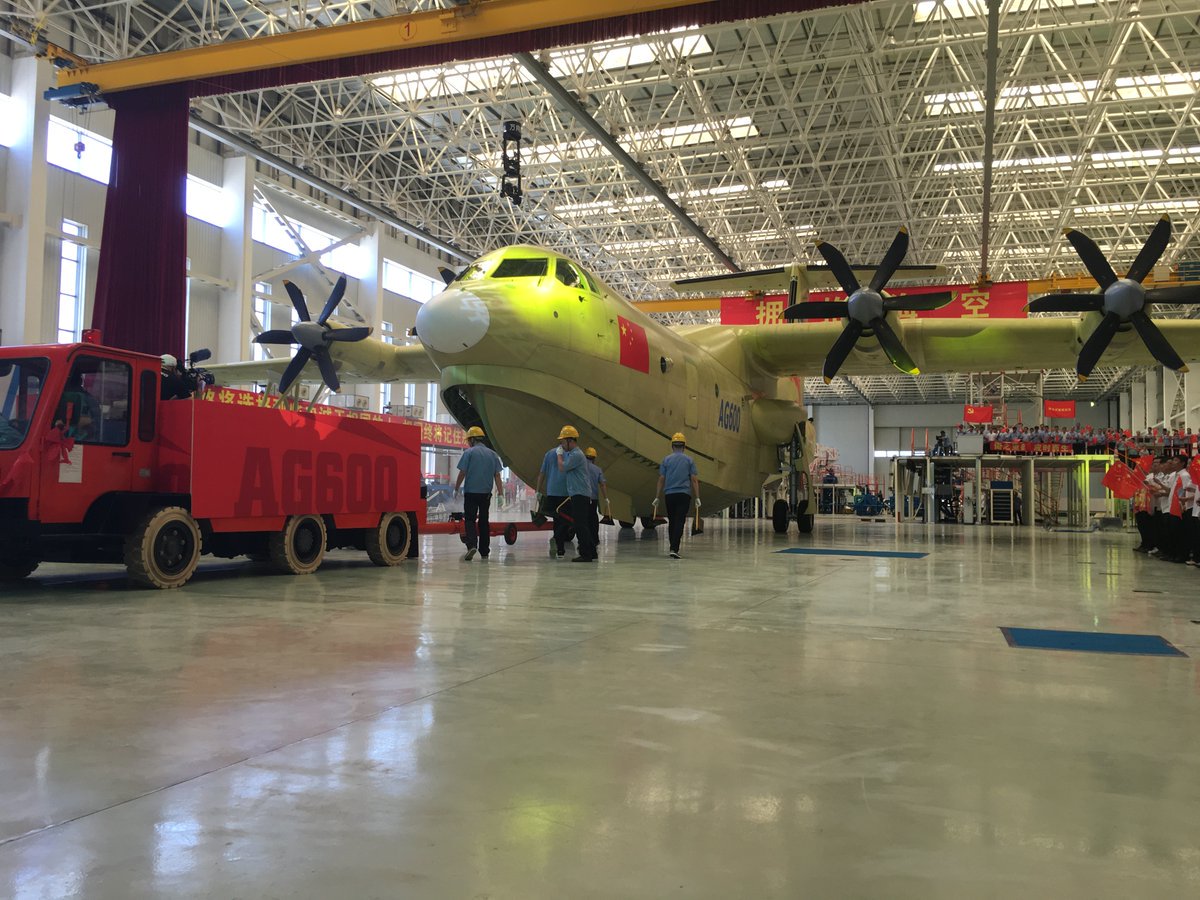Five Ships of the Chinese Navy You Really Ought to Know AboutThe Chinese navy isn’t just an aircraft carrier and submarines—here are five other warships you’ll be seeing a lot of
PLAN warships.
The Chinese navy has undergone an unprecedented buildup over the last decade. It has deployed an aircraft carrier, launched and recovered airplanes from a carrier flight deck, sent new nuclear submarines to sea and even changed its name from the unwieldy “People’s Liberation Army Navy” to simply, well, the “Chinese navy.”
The refurbished carrier Lioaning and the new submarines garner the most attention, but the Chinese navy—now arguably the world’s second most powerful after the U.S. Navy—has made equally important advances with other types of warships. New destroyers, corvettes, troop carriers, hospital ships and even spy ships round out a big and versatile fleet.
Type 056 corvette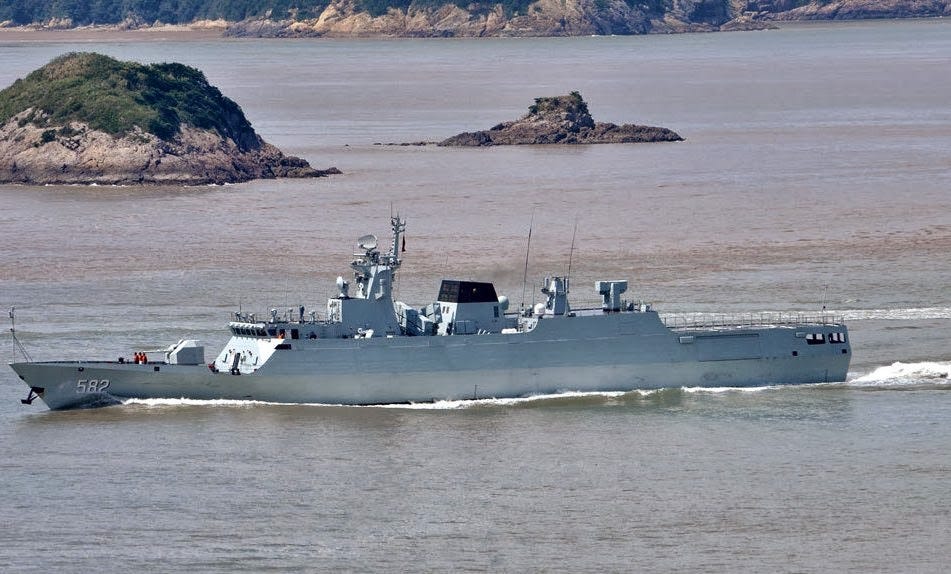
During the Cold War, Nikita Krushchev famously bragged that nuclear missiles were rolling off Soviet assembly lines “like sausages.” China may be restrained in producing nuclear missiles, but it sure is making Type 056 corvettes like sausages, with at least 20 under construction since 2012.
The Type 056s are classified in the West as corvettes—small ships useful for patrolling territorial waters and Exclusive Economic Zones. If China decides to start sending non-Coast Guard ships into the disputed Senkaku Islands area, the Type 056s will likely be the first ships sent in.
The Type 056s have a good mix of self-defense weapons, plus powerful anti-ship and anti-submarine capabilities. The ships mount a 76-millimeter main gun up front for blasting ships and aircraft plus two 30-millimeter rapid-fire guns.
For missile defense, the Type 056s are equipped with a FL-3000N Flying Leopard missile system similar to the American Rolling Airframe Missile. Each launcher includes eight Flying Leopards.
Each Type 056 packs a formidable offensive punch in the form of four YJ-83 Eagle Strike anti-ship missiles. These munitions can attack targets more than 124 miles away with a 350-pound high explosive warhead. In the terminal phase, moments before impacting the target, the missile flies 15 feet above the wavetops at twice the speed of sound, making it difficult for defenders to shoot it down.
Capable of hunting submarines, the Type 056s are fitted with a helipad and hangar for one Z-9 helicopter plus six anti-submarine torpedoes mounted on the deck.
Type 052D destroyer
The Type 052D series of destroyers resembles the U.S. Arleigh Burke-class both externally and in mission. Like the Burkes, the 052Ds have distinctive large, flat-faced radars just under the bridge—and are designed to provide air defense to naval battle groups, particularly carrier battle groups. Beijing has built four Type 052Ds, so far.
The Type 052Ds are equipped two banks of 32 missile silos each, located for and aft. These primarily carry HQ-9 Red Banner air-defense missiles but some analysts, including author Eric Wertheim of Combat Ships of the World, speculate the silos could also pack land-attack cruise missiles similar to the American Tomahawk.
The HQ-9 is a derivative of the Russian S-300, similar to the American Patriot missile. With a range of 124 miles, it intercepts its target at speeds of up to Mach 4. The HQ-9 is capable of hitting low-flying aircraft and missiles all the way up to some ballistic missiles. The Red Banner packs an unusually heavy warhead of 400 pounds.
Other than the Red Banner missiles, ship armament consists of eight Eagle Strike missiles, one 100-millimeter dual-purpose gun, two close-in weapon systems and six anti-submarine torpedoes.
The new destroyers have a helipad and hangar to accommodate one medium-sized helicopter.
Type 071 amphibious landing dock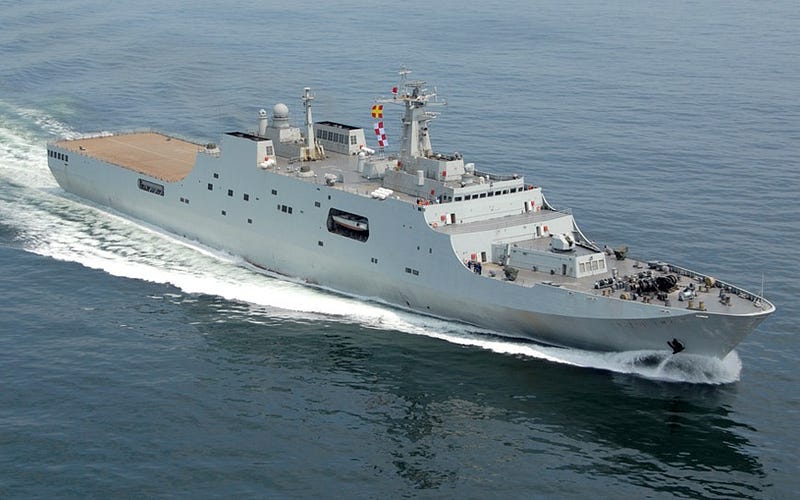
Analysts used to deride Chinese plans to invade Taiwan as “the million-man swim,” due to the Chinese navy’s lack of amphibious lift. But lately China has been building a flotilla of amphibious ships, the backbone of which is the new Type 071 amphibious transport dock.
The Hudong-Zhonghua Shipyard of Shanghai has completed three Type 071s, with another three apparently planned.
The Type 071 class can carry up to a battalion of marine infantry, roughly 400 to 800 troops, and has two vehicle decks capable of storing up to 18 armored vehicles. The dock ships can get troops and vehicles to shore by helicopter and landing craft. They have a flight deck capable of simultaneously operating two Z-8 troop-carrying helicopters, and can store another four in a large hangar.
The ships also have a very large well deck—think of it as a hangar for landing craft that can be flooded with seawater—that can store and launch amphibious vehicles, rigid hulled inflatable boats and four transport hovercraft similar to the American LCAC.
The ships each have limited self-defense protection in the form of a single 76-millimeter gun and four 30-millimeter close-in weapon systems. As defenses go, that’s not much, and the Type 071s will rely on other ships in a naval battlegroup to defend them.
Appropriately, the new dock ships based with China’s South Seas Fleet, where they can threaten Taiwan. They have also been sent to the Horn of Africa to serve in China’s anti-piracy force.
‘Dongdiao’-class missile surveillance and intelligence ship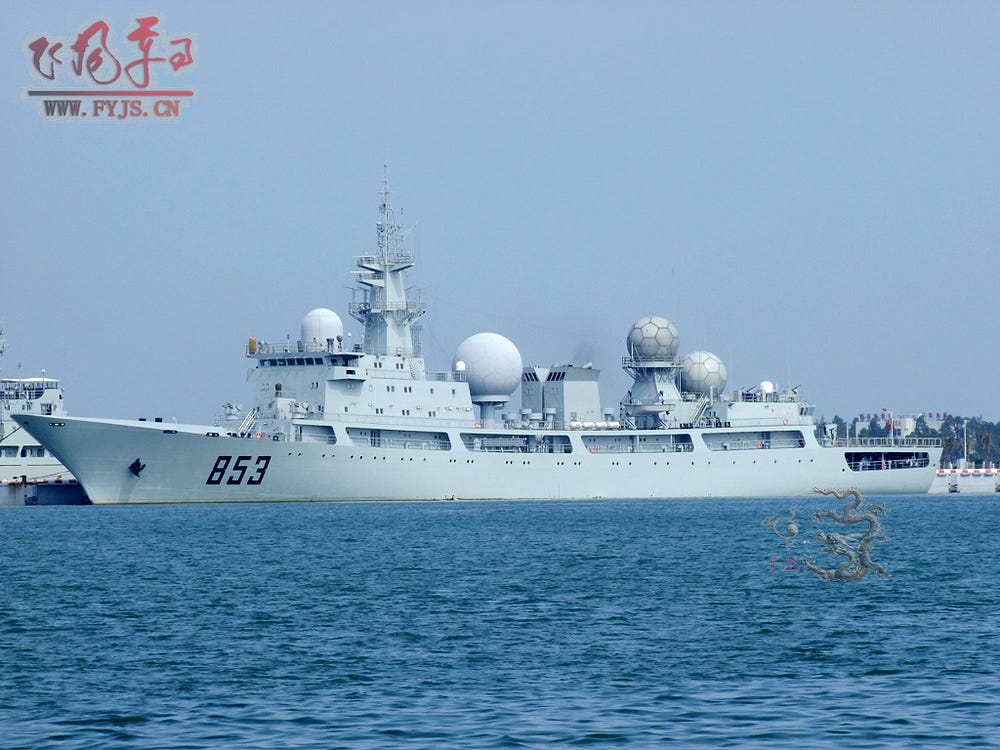
The two ships of the Dongdiao class are easily recognizable by their three spherical radar domes, making them look like they are hauling giant soccer balls.
Built by the Quixin Shipyards of Shanghai, the Dongdiao ships are designed to observe missile tests at sea. The spherical domes cover a variety of sensors, particularly tracking radars and optical tracking systems. The ships also feature recovery cranes for scooping up spent missiles from the ocean.
The Dongdiaos have been described as “spy ships,” due to their secondary role observing naval activities of other nations. The class is what is known as an ELINT, or electronic intelligence, collection platform. The ships feature a variety of antennas for sucking in electronic signals from the air. The signals can then be returned to China for analysis.
The lead ship in class was last seen around Hawaii during the 2012 multinational Rim of the Pacific war game, where it was likely observing the exercise and collecting intelligence. Last fall, a rumor originating in the Hong Kong press announced that one of the ships had returned to the Hawaiian coast, but the rumor proved false.
Armament on the Dongdiao class is minor, amounting to a single manually-operated 37-millimeter cannon, two dual 25-millimeter cannons and a triple anti-submarine torpedo mount.
Type 920 hospital ship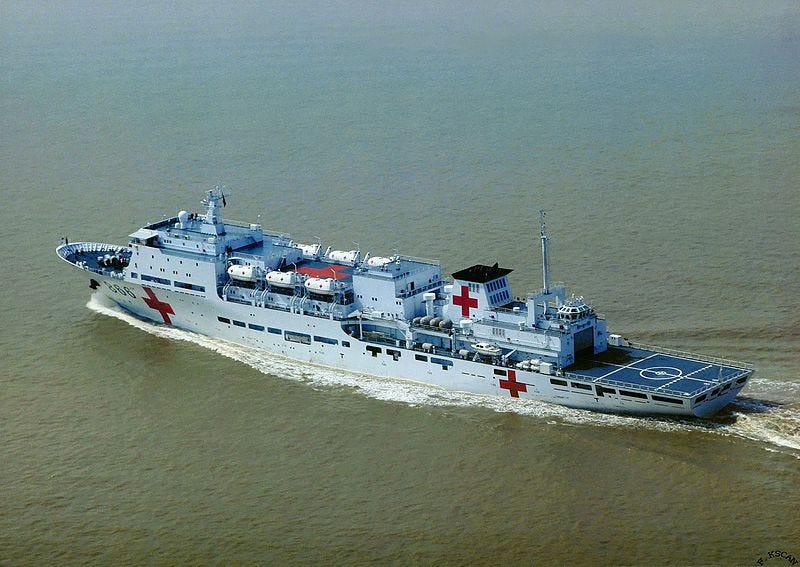
The single Type 920 is a second-generation hospital ship built for China by the Guangzhou Shipyards. Launched in 2007, the ship has a crew of 200 and can carry an additional 400 medical personnel. The ship’s wartime name is Daishandao and in peacetime is known as Peace Ark.
Like the hospital ships of the American Mercy class, the Peace Ark is a full-fledged floating hospital with eight operating rooms, 20 intensive care units and the ability to conduct 40 major surgeries per day. The ship has a helicopter landing pad and six small boats to ferry patients, supplies and personnel between the ship and shore.
Foreign analysts originally suspected Peace Ark was meant to support an invasion of Taiwan. Regardless, the hospital vessel has sailed on numerous “soft power” humanitarian missions, showing Chinese goodwill by providing free medical services in poor countries around the world.
The ship traveled to Africa, the Indian Ocean and South Asia in 2010, rendering medical treatment in Djibouti, Tanzania, Kenya, the Seychelles and Bangladesh. Peace Ark sailed on a similar mission to the Caribbean and Central America in 2011.
Last month, the Chinese government was heavily criticized for not sending Peace Ark to The Philippines in the aftermath of Typhoon Haiyan. The government later relented and the ship belatedly deployed to provide medical care to typhoon survivors.





 higurashihougi
higurashihougi